Related Research Articles
Sharpe is a series of historical fiction stories by Bernard Cornwell centred on the character of British soldier Richard Sharpe. The stories formed the basis for an ITV television series featuring Sean Bean in the title role.
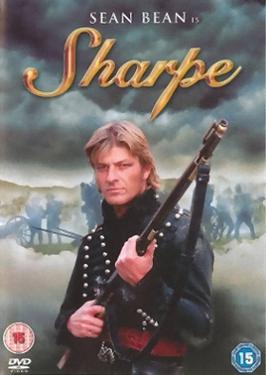
Sharpe is a British television drama series starring Sean Bean as Richard Sharpe, a fictional British soldier in the Napoleonic Wars, with Irish actor Daragh O'Malley playing his second in command Patrick Harper. Sharpe and Harper are the heroes of the Sharpe series of novels by Bernard Cornwell; most, though not all, of the episodes are based on the books. Produced by Celtic Films and Picture Palace Films for the ITV network, the series was filmed mainly in Crimea, with recording of other episodes in Turkey, England, Portugal, and Spain. The two final episodes were filmed in Jaipur, India.

Sharpe's Havoc: Richard Sharpe and the Battle of Oporto is the seventh historical novel in the Richard Sharpe series by Bernard Cornwell, first published in 2003.

Sharpe's Prey is the fifth historical novel in the Richard Sharpe series by Bernard Cornwell, first published in 2001. The story is set in 1807 during the Napoleonic Wars.
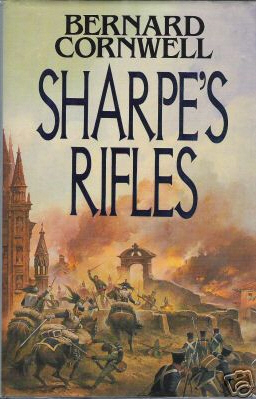
Sharpe's Rifles is chronologically the sixth, but the ninth published, historical novel in the Richard Sharpe series by Bernard Cornwell, first published in 1988.
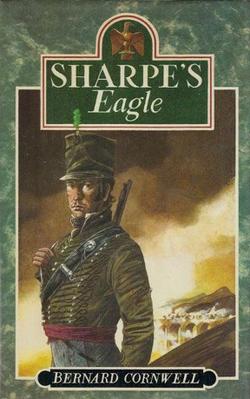
Sharpe's Eagle is a historical novel in the Richard Sharpe series by Bernard Cornwell, first published in 1981. The story is set in July 1809, in the midst of the Talavera Campaign during the Peninsular War. It was the first Sharpe novel published, but eighth in the series' chronological order.
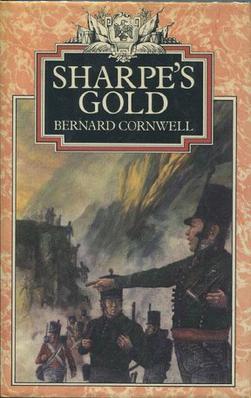
Sharpe's Gold is the second historical novel in the Richard Sharpe series by Bernard Cornwell first published in 1981. The story is set in August 1810 and features the destruction of Almeida during the Peninsular War.
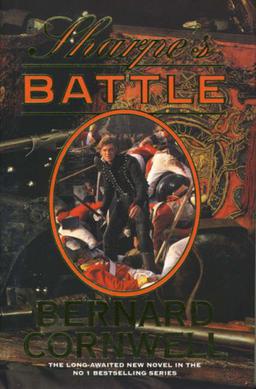
Sharpe's Battle is the twelfth historical novel in the Richard Sharpe series by Bernard Cornwell, first published in 1995. The story is set during the Peninsular War in Spain in 1811.
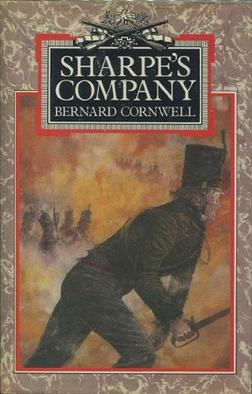
Sharpe's Company is a historical novel in the Richard Sharpe series by Bernard Cornwell, first published in 1982. It was the third in the series to be published, but is thirteenth in chronological order. The story is set January to August 1812 featuring the Siege of Badajoz during the Peninsular War.
Sharpe's Eagle is the second in the series of Sharpe historical war television dramas, based on the 1981 novel of the same name. Shown on ITV in 1993, the adaptation stars Sean Bean, Daragh O'Malley and Assumpta Serna.
Sharpe's Gold is a 1995 British television drama, the sixth of a series screened on the ITV network that follows the career of Richard Sharpe, a British soldier during the Napoleonic Wars. The drama has almost nothing in common with the novel of the same name by Bernard Cornwell. Scriptwriter Nigel Kneale explained, "I didn't use much of [the book]. I used the first ten pages, I think. Then I had an idea which would be more fun to do. It was all about magic by the time I was through with it."
Sharpe's Mission is a British television drama, the 11th of a series that follows the career of Richard Sharpe, a British soldier during the Napoleonic Wars. Unlike most of the other installments of the series, this episode was not based on a novel by Bernard Cornwell.
Sharpe's Siege is a British television drama, the tenth of a series that follows the career of Richard Sharpe, a British soldier during the Napoleonic Wars. The adaptation is based on the 1987 novel of the same name by Bernard Cornwell.
Sharpe's Battle is a 1995 British television drama, the seventh of a series screened on the ITV network that follows the career of Richard Sharpe, a fictional British soldier during the Napoleonic Wars. It is somewhat based on the 1995 novel of the same name by Bernard Cornwell, though the film is set in 1813 on the Spanish-French border, rather than in 1811 on the border with Portugal.
Sharpe's Company is a British television drama, the third of a series that follows the career of Richard Sharpe, a British soldier during the Napoleonic Wars. This episode is based on the 1982 novel of the same name by Bernard Cornwell.
Sharpe's Enemy is a British television drama, the fourth of a series that follows the career of Richard Sharpe, a British soldier during the Napoleonic Wars. This episode is based on the 1984 novel of the same name by Bernard Cornwell.
Sharpe's Regiment is a British television drama, the ninth of a series that follows the career of Richard Sharpe, a British soldier during the Napoleonic Wars. This episode is based on the 1986 novel of the same name by Bernard Cornwell.
Sharpe's Honour is a 1994 British television drama, the fifth of a series screened on the ITV network that follows the career of Richard Sharpe, a fictional British soldier during the Napoleonic Wars. It is based on the 1985 novel of the same name by Bernard Cornwell.
Sharpe's Waterloo is a British television drama, the 14th part of a series that follows the career of Richard Sharpe, a fictional British soldier during the Napoleonic Wars. The adaptation is based on the 1990 novel of the same name by Bernard Cornwell.
References
- ↑ Programme end credits
- ↑ Ferrier, Morwenna (15 March 2009). "Paul McGann, actor, 49". My body & soul. The Guardian. Retrieved 24 February 2019.